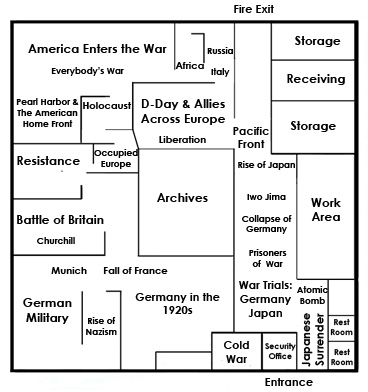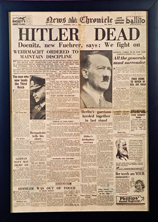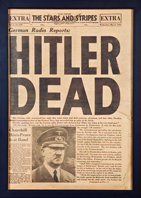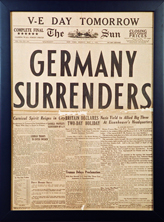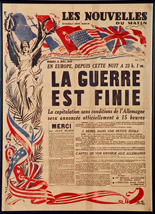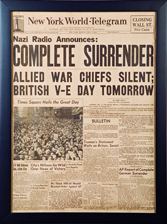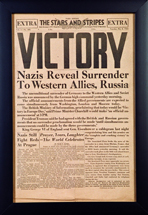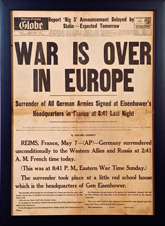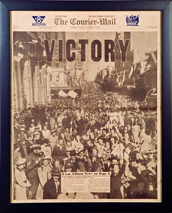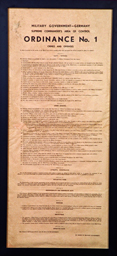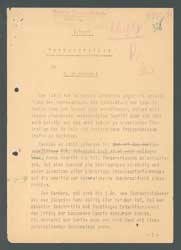 |
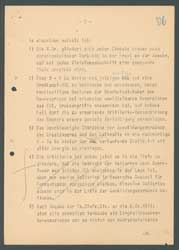 |
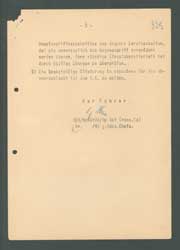 |
Hitler orders on March 30, 1945, that the “German Army, from the Commander in Chief to the youngest man, be entirely aware that only the toughest will to resistance and fanatic determination can guarantee the success of the coming fight. Then the battle before Berlin must and will end with a decisive victory.” The document promises that “the forces liberated in east and west Prussia will arrive “later and give specific orders to various units for the final defense of the German capital.” |
|
| |
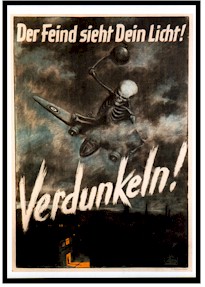 |
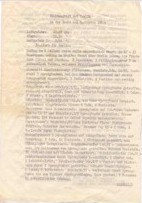 |
German report on one of the first air raids on Berlin. |
|
| |
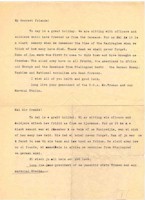 |
Message prepared by the Russians to be read upon meeting the American troops on the Elbe. |
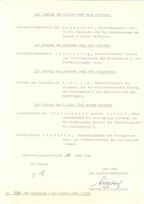 |
Hitler fires his Supreme Commander on the Western Front as the Allies cross the Rhine River. |
|
| |
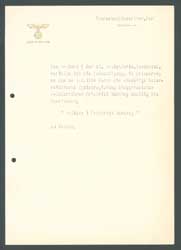 |
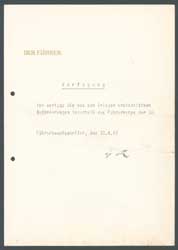 |
The embattled Hitler on his last birthday – ten days before his suicide – orders meaningless promotions. |
|
| |
|
| |
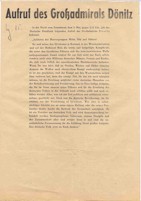 |
APPEAL BY GENERAL DÖNITZ 2:15 A.M.
“At 2:15 A.M. on Saturday, May 5, the German Radio broadcast the following appeal by Great Admiral Dönitz: ‘Soldiers of the Army Groups Middle, South and Southeast! Along with the divisions in Courland, at the mouth of the Vistula, and on the Hela Peninsula, you are the last consolidated forces which are resisting, under your proven leaders, the Bolshevik wave. In so doing you are not only protecting yourselves, but also many millions of German men, women and children who are still to the East of the area under American power. If you now hear that in the North, West and South individual armies have laid down their arms after an honorable fight, this happened because the fight with the Western powers has lost its meaning, for the only goal that we must go on fighting for is the preservation of as many German people as possible from bolshevization and slavery. That is your holy duty, which you must and will fulfill according to the will of our dead Führer and for the preservation of the German people in the future. Everything I undertake at present politically and militarily is only happening to protect you and the German populace you are protecting from destruction. But he who with egotistical intent only thinks of his own salvation or that of his unit, makes the preservation of the whole impossible. He is a traitor to the German people and will be treated accordingly. Unconditional obedience, iron discipline, and everyone sticking together are needed more than ever and are the indispensable precondition for the fulfillment of your great task. The German people will thank you for it.”
Shortly before the collapse of the Nazi regime, on April 20, 94, Hitler appointed Dönitz head of the northern military and civil command. Then, in his last political testament, the Führer named named Dönitz his successor as president of the Reich, Minister of War, and Supreme Commander of the Armed Forces. Hitler committed suicide on April 30 and Dönitz assumed the reins of the government on May 2, 1945, but retained control for only a few days as the surrender of all German forces was signed on May 8. |
|
| |
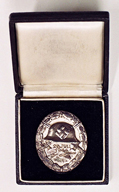 |
Silver wound badge presented to Hitler's Naval Aide Admiral Puttkamer, who was seriously wounded with Hitler during the July 20, 1944 assassination attempt. Hitler had this special award created for the occasion. |
|
| |
|
|
| |
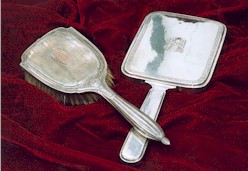 |
Hitler’s monogrammed hairbrush from the Berghoff, Obersalzberg and hand mirror from his apartment on Prinzregentenplatz in Munich. |
|
| |
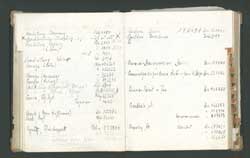 |
Hitler’s telephone directory from his Berghof, Obersalzerg, including many entries in his own hand. |
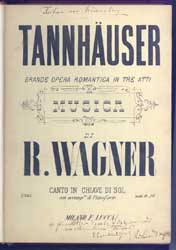 |
Hitler's copy, inscribed by Wagner. |
|
| |
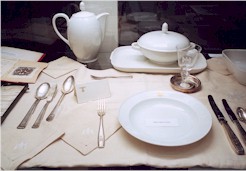 Hitler’s Dinner Service. From Hitler’s Führerbau, Munich. Hitler’s Dinner Service. From Hitler’s Führerbau, Munich. |
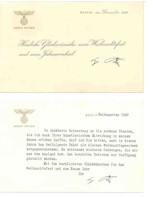 |
From Hitler’s Führerbau, Munich. |
|
| |
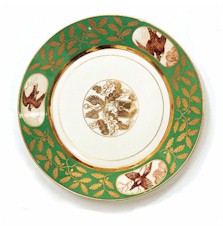 |
Goering’s Dinner Service |
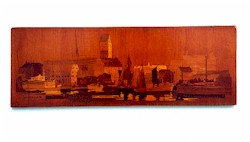 |
An inlaid wall section from the bedroom on Goering's private train |
|
| |
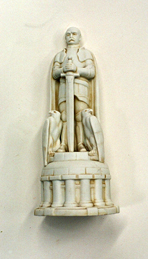 |
The pseudo-medievalism of the Bismarck Memorial in Hamburg unveiled in 1906 promises a revival of past glories under a new National Leader. This statue is from Hitler's desk. |
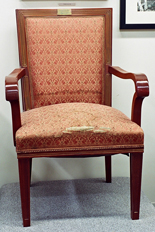 |
Chair used at Hitler's desk in the bunker under the Reichschancellery. Removed by General Cutler, who had the brass plaque placed on the back of the chair: "From Hitler's bombproof office under Reichschancellery, Berlin, 10 July, 1945." The chair was originally part of Hitler's dining room service in the Reichschancellery, and is shown in Albert Speer's book. |
|
| |
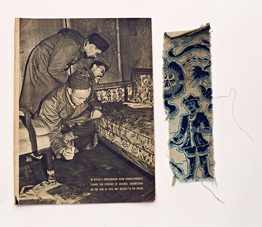 |
Blood-stained fabric from the center of the sofa on which Adolf Hitler and Eva Braun committed suicide from the Fuhrerbunker, Berlin, taken by Brigadier General Boudinot. |
|
| |
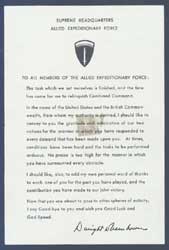 |
Eisenhower’s message “To All Members of the Allied Expeditionary Force”. |
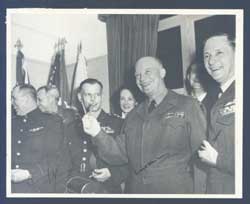 |
|
| |
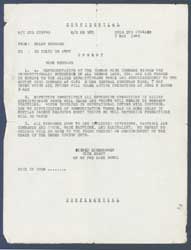 |
Eisenhower’s message to Patton’s 3rd Army that the Germans have surrendered. |
|
| |
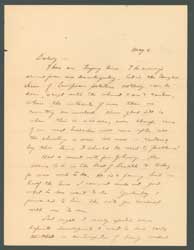 |
Dwight Eisenhower, on the eve of peace, to his wife Mamie, May 6, 1945: “These are trying times. The enemies’ armed forces are disintegrating, but in the tangled skin of European politics nothing can be done, except with the utmost care and caution, where the interests of more than one country are involved. How glad I’ll be when this is all over, even though some of our worst headaches will come after all the shooting is over. Oh well – certainly by this time I should be used to the problems…. Last night I really expected some definite developments and went to bed early in anticipation of being waked up…. Nothing happened and as a result I was wide awake, very early – with nothing decent to read. The Wild Wests I have just now are terrible. I could write better ones left-handed. Well – here are the papers – now I’ll see what every office all over the world has to tell me. In such times as these, everybody and his brother have to have their say.” |
|
| |
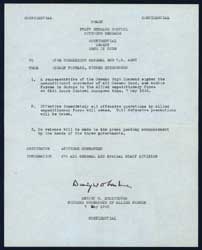 |
Dwight Eisenhower, signed original message to George Patton. |
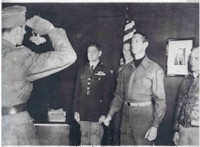 |
|
| |
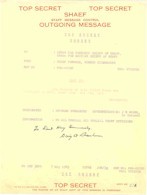 |
The end of the war in Europe: Eisenhower presents Kay Summersby with a copy of his message “The mission of this Allied Force was fulfilled…May 7, 1945.” |
|


